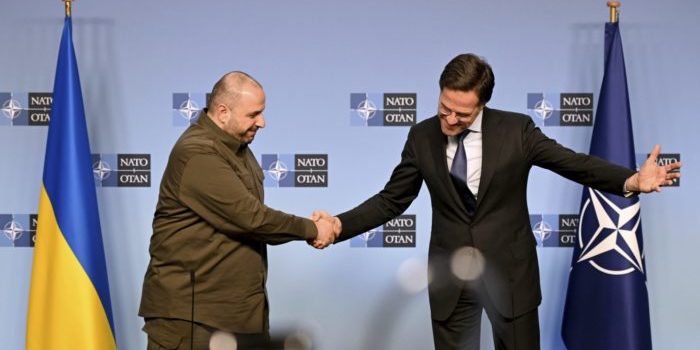(Headline USA) Several NATO allies demanded on Thursday that Ukraine and Europe not be cut out of any peace negotiations—despite an alarming interview recently in which Ukrainian President Volodymyr Zelenskyy appeared to precondition any such negotiation on his country’s access to nuclear weapons.
“There can be no negotiation about Ukraine without Ukraine. And Ukraine’s voice must be at the heart of any talks,” U.K. Defence Secretary John Healey told reporters at NATO headquarters, as the organization’s 32 defense ministers met for talks on Ukraine.
The NATO ultimatum came after President Donald Trump on Wednesday revealed that he had spoken at length with Russian President Vladimir Putin, who expressed his own willingness to go to the negotiation table.
After talks with both Putin and Zelenskyy, Trump said he would “probably” meet in person with the Russian leader in the near term, possibly in Saudi Arabia.
Trump also insisted that Kyiv should not be allowed to join NATO—which would obligate NATO allies to engage in an active military conflict with the nuclear power—and said it was up to Europe to protect itself and Ukraine from whatever Russia might do next.
During the Biden administration, the United States funneled hundreds of billions of dollars into Ukraine’s defense against the Russian military, although much of the money remains unaccounted for.
The war-ravaged country has not outlined any specific benchmarks or terms that would provide for an exit strategy. The conflict has been ongoing since a 2014 color revolution ousted Ukraine’s Russia-friendly president, but it picked up steam in 2022, when Russia actively invaded a border region of the former Soviet satellite country that is considered to be culturally Russian.
Zelenskyy, who assumed the presidency of Ukraine in 2019 but has suspended democratic elections during wartime, told British TV host Piers Morgan that short of being allowed to enter the NATO alliance, only one other option was acceptable to him.
“Which support package, which missiles,” he asked. “Will we be given nuclear weapons?”
Zelensky begging through an interpreter for nuclear weapons on a Piers Morgan show is peak level insanity. pic.twitter.com/ygS2nosTp9
— Concerned Citizen (@BGatesIsaPyscho) February 4, 2025
Nonetheless, European governments were left reeling at the prospect of face-to-face talks between the U.S. and Russia.
“For me, it’s clear … that Europe must be involved in the negotiations” said German Defense Minister Boris Pistorius. “And I think that’s very easy to understand [… particularly if Europe is] supposed to play a central—or the main—role in the peace order.”
Europe “will have to live directly” with the consequences, he added.
U.S. Defense Secretary Pete Hegseth rejected claims that the U.S. was throwing Ukraine under the bus through Trump’s efforts to achieve a peaceful resolution.
“There is no betrayal there,” Hegesth told reporters. “There is a recognition that the whole world and the United States is invested and interested in peace—a negotiated peace.”
The European Union’s foreign policy chief, Kaja Kallas, expressed surprise that Hegseth and Trump had listed what appeared to be concessions to Russia even before talks had begun in earnest.
“We shouldn’t take anything off the table before the negotiations have even started, because it plays to Russia’s court,” she said.
“Why are we giving them everything that they want even before the negotiations have been started?” she continued. “It’s appeasement. It has never worked.”
Hegseth warned that the war in Ukraine must “be a wakeup call” for NATO’s European allies to spend more on their own defense budgets.
While 23 of the 32 member–countries were forecast to have met the organization’s guideline of spending 2% of the country’s gross domestic product on their national defense budgets last year, nearly a third of them still do not.
Hegseth’s French counterpart, Sébastien Lecornu, claimed the wrangling over greater defense spending was “a false debate,” saying that governments and parliaments across Europe were already approving more weapons purchases and bigger military budgets while helping Ukraine stave off an invasion.
Lecornu warned that the future of NATO itself was now in question after the U.S.—by far NATO’s biggest and most powerful member—signaled that its security priorities lay elsewhere, including in Asia.
“To say that it’s the biggest and most robust alliance in history is true, historically speaking,” Lecornu said. “But the real question is, will that still be the case in 10 or 15 years?”
NATO Secretary–General Mark Rutte, who was chairing Thursday’s meeting, said that whatever agreement was struck between Russia and Ukraine, it was crucial that the “peace deal is enduring, that Putin knows that this is the end, that he can never again try to capture a piece of Ukraine.”
Touting Europe’s investment in Ukraine, Swedish Defense Minister Pål Jonson said European nations provided about 60% of the military support to Kyiv last year and must be involved, especially given U.S. demands that Europe take more responsibility for Ukraine’s security in the longer term.
His Estonian counterpart, Hanno Pevkur, maintained that the European Union has driven sanctions against Russia, has invested heavily in Ukraine’s defense, and will be asked to foot the bill for rebuilding the war-ravaged country.
“We have to be there. So there is no question about it. Otherwise this peace will not be long lasting,” Pevkur warned.
European sanctions against Russia have not always been consistent, with some nations—including Germany—continuing to rely on the country for their energy supply.
Western corporations—including BlackRock—have eagerly eyed Ukraine as a prize that will yield lucrative rebuilding contracts as part of a public–private partnership, similar to the nationbuilding that occurred in Iraq during the George W. Bush administration. Since the withdrawal of U.S. forces, the oil-rich country, which was once bitter enemies with neighboring Iran due to theological differences, has grown increasingly close to the U.S. adversary.
Adapted from reporting by the Associated Press

